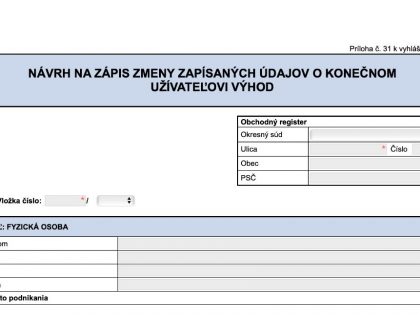How to prevent our debtors from disposing of their assets
Our company has been cooperating with a Slovak business partner. After several years of a good relationship and good payment discipline on the Slovak partner’s side, they suddenly stopped paying our invoices. Before we discontinued our deliveries, their debt had risen to a significant amount. As soon as we realized they would not pay us voluntarily, we filed for a European order for payment. Once the court awards this payment order to us, we will be authorized to attach the Slovak company’s assets to satisfy our claim. We know that they own an administrative building and land with a high value, and we found out that they were advertising its sale. We are afraid their intention is to sell the valuable assets, take the money out of the company, and then leave it empty without meeting their obligations to us and probably other creditors. How can we prevent them from selling this valuable asset? We believe that what they are intending to do is cause damage to us as their creditor and we want to protect our rights. Are the directors of the company criminally liable for this? What can we do?
We believe that first of all you can file a petition for a measure to secure your claim to the Slovak court. This possibility arises under section 343 of the Slovak Code of Civil Disputes Procedure. The court may establish a pledge over the administrative building and the land owned by the Slovak company to secure your claim.
However, Slovak courts are not very keen on issuing security measures. The claimant should convince the court that there is a serious threat that the claimant’s receivable is endangered, or, more precisely, that there will not be enough assets on the debtor’s side to satisfy the claimant’s receivable in the case the court decides in the claimant’s favour. If your debtor advertises the sale of immovable assets and has no other assets of substantial value, this looks like good grounds for a favourable court decision on granting a security measure.
In the case the court grants the security measure (i.e. it establishes a pledge over the immovable assets) your debtor will be able to sell the building and the land; however, the pledge established in your favour to secure your receivable will stay attached to the building and the land. In practice, this means that the debtor will either not be able to sell the asset or that the buyer will buy the asset knowing that they will have to endure the sale of the asset once you receive a court award and your Slovak debtor will not satisfy it voluntarily.
The criminal liability of the directors comes into consideration as well. Slovak law recognizes a special category of “insolvency criminal offences” for which, if found guilty, the directors may be sentenced and banned from activities or even imprisoned for up to several years. These offences include damaging the creditor as well as the preferential treatment of the creditor.
If the court does not grant a security measure to you, or the Slovak debtor manages to sell the immovable assets prior to you receiving the court’s protection, the criminal offence of damaging the creditor or the criminal offence of the preferential treatment of the creditor comes into consideration. Damaging the creditor is specified as defeating their satisfaction by damaging or impairing the asset, or by making it unusable by concealing, selling, exchanging, or otherwise removing even a part of the debtor’s assets. The definition of this offence is wider, but the quoted part above includes the sale of assets. Therefore, if the Slovak company sells the building and the land without satisfying your claim, the liability of its directors comes into consideration.
The police investigators would have to verify the intention of the sale, what happened with the proceeds of the sale of the immovable assets, whether there were other creditors and how they were satisfied, whether the sale price was at market level, and other matters. It may be the case that that the directors used the proceeds of the sale for the preferential treatment of other creditors, and their actions fall under this criminal offence.
In any case, we recommend that you file a criminal complaint describing the events along with all the evidence you have, including advertisements, your estimate of the purchase price of the building, and your suspicion that the directors are acting with an intention to avoid the payment of your claims. Whether the police find enough evidence to accuse the directors from any criminal offence is not a certain matter, but you can at least act and utilize all possible means to protect your rights.

































